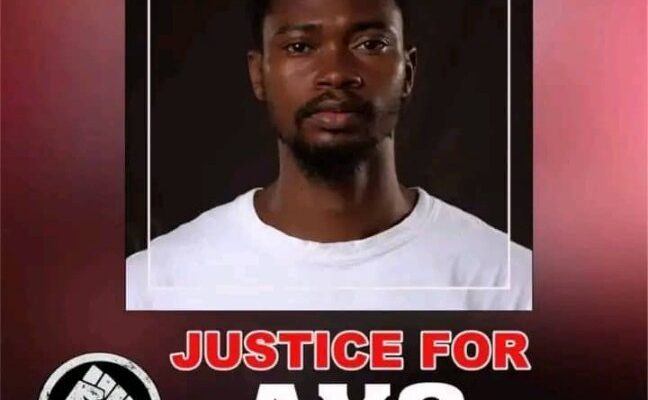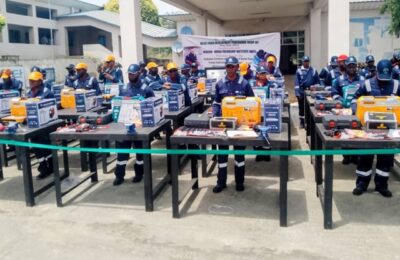The dead don’t speak, but sometimes their silence shouts. The nation woke up on Wednesday, July 23, 2025, to an unspeakable horror that no headline could wrap in words. A promising Kogi-based photojournalist, Aiyepeku Ayo, was murdered, dismembered, and partially mutilated in his own compound at the Government Reserved Area (GRA), Lokoja. His alleged killer? Not a bandit. Not a terrorist. But his neighbor, Adebayo Pelumi, a serving officer with the Nigerian Correctional Service.
The irony is not lost: a custodian of justice turning into a priest of carnage. It didn’t happen in the forest. It happened in a secured estate, behind Bougainvillea fences and quiet streets. “We heard no gunshot,” said one neighbour. “Only screams. Then silence.”
Residents reported seeing blood trails leaking into the compound drainage, followed by the haunting discovery: limbs wrapped in bedsheets, a camera smashed into pieces, and an empty Bible opened to Psalm 91. “It wasn’t just a killing,” said an eyewitness. “It was a defilement.”
The incident is now under active investigation by the Kogi State Police Command. In an emergency press briefing, DSP William Aya confirmed:
“The suspect, Officer Adebayo Pelumi, is in custody. Preliminary findings suggest deliberate homicide. The matter is being handled with utmost seriousness.”
But for many in Kogi, this is not an isolated crime. It is a symbol of a deeper rot, a society where darkness no longer hides in forests, but lives among us — in uniforms, in churches, in mosques, in government buildings. This is not just a murder. It is a manifesto of madness, unfolding silently across the Middle Belt.
Rev. Dr. Joshua Alabi, speaking during a vigil at the scene, lamented:
“When a neighbor becomes a predator, and the arm of the law becomes a sword of Satan, who then shall we trust?”
The murder of Aiyepeku Ayo has now become a flashpoint — not just for media unions, who are demanding full justice, but also for religious and civic groups across the country. “Ayo was more than a photographer,” said his editor at Kogi Metro Weekly. “He was a voice. And his voice was silenced with machetes.”
But Ayo’s case is just one in a spike of ritual-styled, premeditated murders in Kogi and beyond. From sex workers in Bauchi to schoolgirls in Lokoja, from pastors in Edo to toddlers in Makurdi, a pattern is forming — methodical, morbid, and mystifying.
These are not random killings. Many bear markings: blood inscriptions, amulets, tied limbs, mutilated reproductive organs. And in some scenes, passages from either the Bible or Qur’an are deliberately placed — a macabre spiritual theatre mocking faith and justice alike.
“This is not crime. This is blasphemy soaked in blood,” said Imam Yakubu Abdulkadir, a Lokoja-based cleric who recently held interfaith prayers after another dismembered body was discovered near the confluence bridge. “If we don’t rise now, we will fall without prayer.”
Security operatives have, at times, dismissed these incidents as isolated acts. But mounting evidence suggests otherwise. So far, over 58 cases of homicides has occured in Kogi State between January and June 2025 with similar modus operandi — bodily dismemberment, ritual objects, and silence from neighbours.
The prominent Pastor in Kogi State once warned, “When the church loses fire, the streets gain darkness.” And in many parts of Nigeria today, even streetlights fear to shine.
What then is feeding this evil? Experts point to a dangerous blend of spiritual delusion, economic desperation, political ambition, ritualism and/or mystical ideologies. Some of these killers claim they are obeying supernatural commands; others seek political elevation through human sacrifice.
Dr. Paul Ilemona, a policy researcher, noted:
“This is beyond cultism. We’re witnessing the evolution of spiritual terrorism — murder justified by mystery, killings camouflaged in religion.”
In Kabba, a young apprentice confessed in March to participating in three sacrificial killings to “buy his destiny back from the marine world.” He said, “They told me success is blood-activated.”
Ancestral Igala taboos no long hold waters. The elders admit that modernity has stripped traditions of their teeth. Chief Adama Ochai of Ayija declared in a town meeting:
“The gods are angry. They no longer protect because we no longer honour.”
But some in the Church believe redemption is possible. Dr. Paul Enenche, preaching during a nationwide fasting summit, declared:
“This evil shall pass. But we must not pray silently while the altars of Baal burn our children.”
The killing of Aiyepeku Ayo, a man who once photographed Kogi’s floods, weddings, and political campaigns, has become a metaphor — a symbol of how deeply society has betrayed its watchers. The watchman has been slain. His camera shattered. His memory mutilated.
Yet even in death, Ayo’s voice cries louder. His blood joins the cry of Abel, reaching the heavens, accusing a system that allowed evil to dress in uniform.
The Nigerian Union of Journalists (NUJ) has called for a full judicial panel, urging the federal government to declare July 22 as a national day of mourning for slain media workers.
“You can silence our cameras, but not our cause,” NUJ Kogi Chairman, Fidelis Oloko, warned.
As Nigeria stares into the mirror of this crisis, one truth stands tall: We are no longer merely victims of violence. We are neighbours to demons in human skin. And until we name this evil, fight it with fire, and purge it with prayers and policy, it will continue to grow — with badges, Bibles, and blood.
– Inah Boniface Ocholi writes from Ayah – Igalamela/Odolu LGA, Kogi state.
08152094428 (SMS Only)




